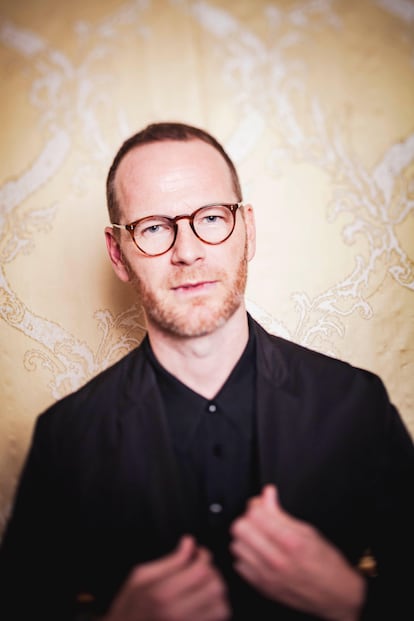Joachim Trier: ‘The monogamous are the real romantic heroes of our time’
The Norwegian director, who is in the running for two Oscars for ‘The Worst Person in the World,’ talks to EL PAÍS about the ‘homogeneity’ of romantic representations and why love is ‘the most complicated thing that exists’

After two movies abroad, Norwegian film director Joachim Trier has returned home with The Worst Person in the World. It’s the third movie, along with Reprise (2006) and Oslo, August 31st (2011), in his so-called “Oslo Trilogy.” As well as being set in the Norwegian capital, the movie also follows the same narrative process of those two films: observing one single life under a microscope until an understanding is gained about what makes it at once unique and universal. “I wanted to return to my beginnings, to the time of my first project Reprise, which I filmed 15 years ago. Repeating myself scared me, but I told myself that at my age, I had a right to,” says Trier, 47, in a video call from his home in Oslo.
The Worst Person in the World, which is nominated for the Oscar for Best International Feature Film and Best Original Screenplay, is a portrait in 12 chapters of Julie, a slightly lost twentysomething who keeps making career changes (doctor, psychologist, photographer) as quickly as she changes boyfriends. But in Aksel, a brilliant if somewhat self-centered cartoonist, she has found the perfect partner. That is, if it were not for the age difference: he is at a stage where he wants children, but she doesn’t feel ready yet. Their relationship is tested with the arrival of Eivind, a young waiter with no grand pretensions in life. He becomes Julie’s lover, and in one scene worthy of a Stanley Donen musical, she is seen running across the city to meet him as the rest of the world stands still. “It was a good moment to film this movie,” says Trier. “I have enough experience and I have been on both sides: I have been the young person who doesn’t want kids and the older man who begins to feel the need for children and a home. I have been Aksel, but also Julie.”
The Worst Person in the World can be seen as a new twist on the traditional romantic comedy, a genre which in the hands of Trier – who is considered one of the leading directors of European art film along with Yorgos Lanthimos, Ruben Östlund and Mia Hansen-Løve to name a few – becomes bitter or even tragic. “Many of the great films in the history of cinema can be seen as romantic comedies, from The Philadelphia Story by George Cukor to Annie Hall by Woody Allen, as well as the work of Éric Rohmer [director of My Night at Maud’s]. It’s a genre that allows everything: lightness and musicality, but also an existential premise and deep character work,” says Trier. “It’s the type of cinema that I miss. Today, I see many manufactured, artificial movies. I wanted to simply make a human film, containing the dramas and comedies of life.” For the director, the real theme of the movie is the “ongoing negotiation between our imagined lives, what we had in mind when we were young, and the reality of existence,” including death. “In reality, we don’t have a lot of time ahead of us.”
The romantic comedy genre, dismissed for lacking substance, began to decline at the end of the 1990s. Trier blames this demise in mainstream cinema on the “homogeneity of romantic portraits,” which he attributes to the rise of social media. “Facebook and Instagram have limited the representation of the romantic ideal. We see it in the photos of couples with hashtags such as ‘life is good,’ ‘love wins’ or ‘I feel blessed.’ Movies have tried to reproduce this vision, when love is assuredly the most complicated thing that exists,” he says.
The Worst Person in the World also addresses one of society’s biggest taboos: adultery. “I think, like British psychoanalyst Adam Phillips, that the monogamous are the real romantic heroes of our time. They are the ones who resist the infinite possibility of swiping [on dating apps] and having sex with a limitless number of people. I did not want to judge that, but the movie talks about loving oneself, more than finding a partner.” The Worst Person in the World also examines the issue of growing up, even if it’s at age 30 or 40. “The classic Bildungsroman coming-of-age stories were about protagonists who were between 16 and 20 years old. Now maturity arrives much later. It’s even possible for us to continually be going through this process. It could be that the definitive step towards maturity doesn’t happen until we are confronted with our own death,” says Trier.
The director’s penchant for digression is also rare to find in contemporary cinema, which is guided by linear frameworks with the exception of some filmmakers. “I love directors like Martin Scorsese, Wes Anderson and Alain Resnais, who use all possible narrative resources to get to the bottom of what they want to say,” says Trier. “Digression reflects the modern sensibility. I suppose I am the typical post-modern guy who continues to believe that we are fragmented beings. I do everything possible not to focus on the plot. The idea of the plot has taken hold of today’s cinema and television. I love a good detective story, but the narrative can’t dominate everything.”
In The Worst Person in the World, Trier breaks up the movie with scenes that aren’t connected with the narrative heart of the film, such as a monologue on the changing nature of culture and the generational differences regarding the #MeToo movement against sexism.
There is also a moral dimension to the movie, one that is very particular to a Scandinavian director like Trier and linked to guilt. “Guilt emanates from two aspects. On the one hand, the wealth of Norway, the exemplary image of democratic and economic success of which we are so proud of, although we know it all comes from oil. That explains why I don’t have a driver’s license: it’s a useless gesture, but it’s my way of symbolically channeling it,” says Trier. “Secondly, the legacy of Scandinavian Protestantism, always so virtuous, whose sense of blame I have assimilated despite being a complete atheist.”
When it comes to his Oscar chances, Trier says it’s not keeping him awake at night. All signs indicate that the prize will go to Drive My Car. “If it wins, it deserves it. And also Flee, I liked that a lot. It would be fair.” It’s a lesson taught in Norwegian schools: it’s not about winning, it’s all about taking part.
Tu suscripción se está usando en otro dispositivo
¿Quieres añadir otro usuario a tu suscripción?
Si continúas leyendo en este dispositivo, no se podrá leer en el otro.
FlechaTu suscripción se está usando en otro dispositivo y solo puedes acceder a EL PAÍS desde un dispositivo a la vez.
Si quieres compartir tu cuenta, cambia tu suscripción a la modalidad Premium, así podrás añadir otro usuario. Cada uno accederá con su propia cuenta de email, lo que os permitirá personalizar vuestra experiencia en EL PAÍS.
¿Tienes una suscripción de empresa? Accede aquí para contratar más cuentas.
En el caso de no saber quién está usando tu cuenta, te recomendamos cambiar tu contraseña aquí.
Si decides continuar compartiendo tu cuenta, este mensaje se mostrará en tu dispositivo y en el de la otra persona que está usando tu cuenta de forma indefinida, afectando a tu experiencia de lectura. Puedes consultar aquí los términos y condiciones de la suscripción digital.









































